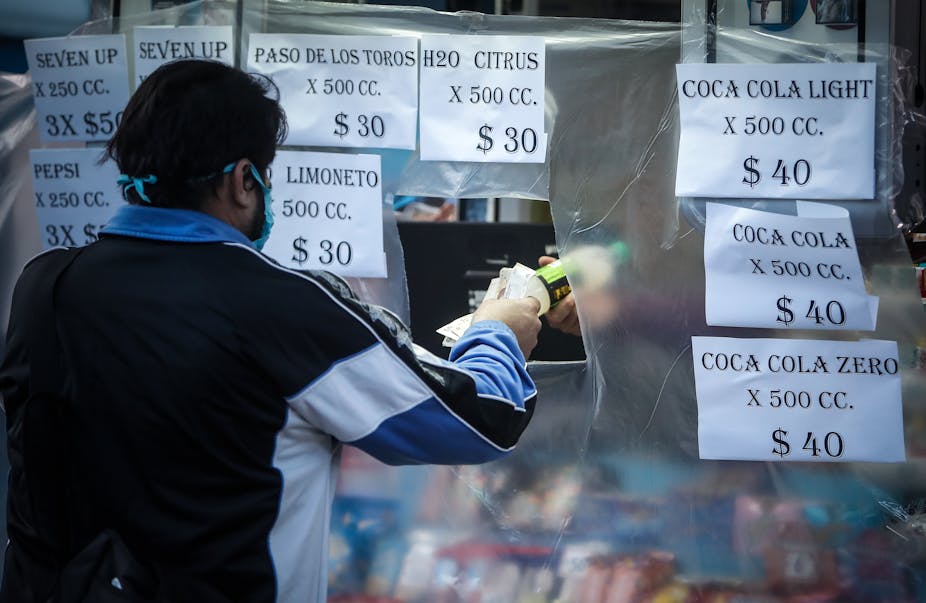Argentina imposed a strict lockdown on its citizens on March 20 and shut down foreign travel after just 128 confirmed cases of coronavirus.
The swift response to the pandemic by the new administration of Argentinian president Alberto Fernández won domestic and international praise for preventing the spread of the disease. There were 5208 reported cases and 273 deaths from COVID-19 by May 6, compared to 23,000 cases in Chile and 126,000 in Brazil. Current quarantine measures are due to be reviewed on May 10 – and there is growing pressures to ease restrictions.
But dealing with the economic and social costs of this success may be a Pyrrhic victory, as the options for Fernández to finance the recovery are limited.
In December 2019, Fernández took over a country already in recession. Inflation was accelerating inflation, foreign currency reserves diminishing and there was yet another looming debt crisis on the horizon.
In February 2020, the IMF declared that Argentina’s debt levels were unsustainable. In mid-April, the economy minister, Martín Guzmán outlined a plan to restructure around US$70 billion (£57 billion) in foreign debt, calling for a three-year moratorium on debt repayments to creditors.
While other countries discuss how to lower or delay taxes to alleviate pressure on business and citizens, Argentina is seeking to find ways to tax itself out of a crisis yet again. But who to tax is not a question with a straightforward answer.
Turning to taxation
Compared to other developing countries around the world, Argentina already has high levels of taxation. It’s a country with a large informal sector and a semi-industrialised economy built around the export of commodities. This means that the sources from which the government can extract additional fiscal revenue are limited to the richer middle and upper classes, and to the agrarian export sector.
Taxation was actually the way Argentina exited its last crisis after the 2001 debt default. At that time, the governments of Eduardo Duhalde and Néstor Kirchner imposed extraordinary emergency taxes on agricultural exports such as soy and wheat. This happened at a moment when global agricultural commodities prices were at near record high levels, helping producers offset the emergency taxes.
Coupled with the celebrated debt default and a political system in crisis, this allowed the Kirchner administrations to tax their way out, consolidating a support base that led them to electoral success for over a decade.
This was not without cost. In 2008, facing another attempt to increase taxes, the rural sector revolted, launching a four-month-long protest that culminated in the Congressional defeat of the proposed tax bill. From then on, this tax strategy became increasingly contentious. It put the left-wing administration, with its allied unions and working-class support base – the tax spenders – in direct opposition with rural producers, business and the urban upper and middle-classes, who see themselves as the tax payers.
This fed into a wider conflict between different conceptions of the state and the social contract. When the conservative, and business-friendly Macri government came to power in 2015, some of its early measures were to lower agricultural taxes, abolish export quotas, cut spending and lower subsidies – while raising debt.

New taxes
The COVID-19 crisis has reignited Argentina’s conflict between the tax spenders and the tax payers, with the Fernández government turning to the rural sector yet again to finance the country’s needs. On taking office it raised soy export taxes from 24.7% to 30% and another 3% in early March. The rural sector, known as el campo, responded to the new tax hike in March with a four-day sales strike. But the context is not the same: commodity prices are lower and producers cannot so comfortably offset the taxes, given tighter profit margins.
A 30% surcharge was imposed in early 2020 on foreign currency purchases and card expenses abroad, targeting the more affluent. Referred to as the “solidarity tax”, it became onerous for those stranded overseas when the pandemic struck. A one-off 3.5% tax on people with over US$3 million in wealth called impuesto Patria (motherland) is being promoted by the harder Kirchnerist wing of the ruling coalition.
Inflation risk
In this context, pot-banging in Buenos Aires city went from celebrating health workers to a campaign calling for politicians to lower their salaries. Meanwhile, a group of business people started an online campaign calling on people not to pay taxes for 90 days.
The government is aware of the dangers of this game – but it needs money. With social tensions rising and political conflict looming, it turned to printing money to finance itself, with the monetary base – the amount of money in public circulation – expanding 30% from February to March. If fiscal revenues fall, as they are already doing, this trend is set to continue.
But monetary theory indicates this is the path to inflation and, in a country with already double digit numbers, orthodox economists are raising alarms of an inflationary spiral.
All Fernández’s options look grim: to tax sectors already aggrieved (and taxed) and aggravate their enmity, or aggravate inflationary pressures and risk popular discontent. Picking lesser evils and delaying outcomes is all this impossible game may allow him to do.


